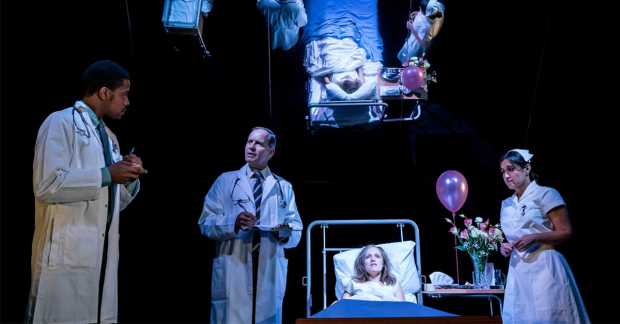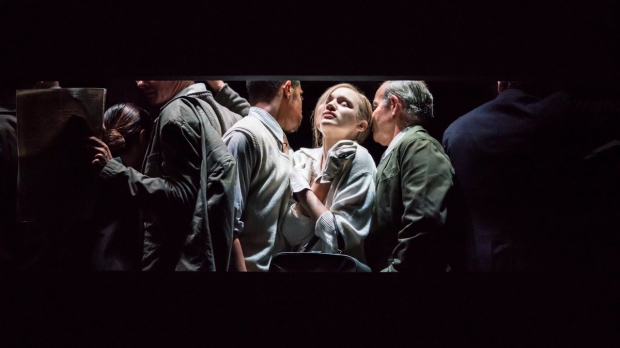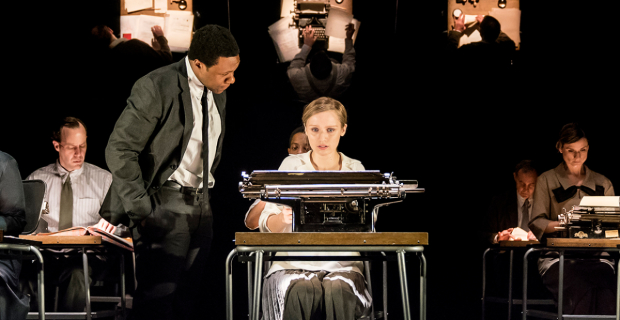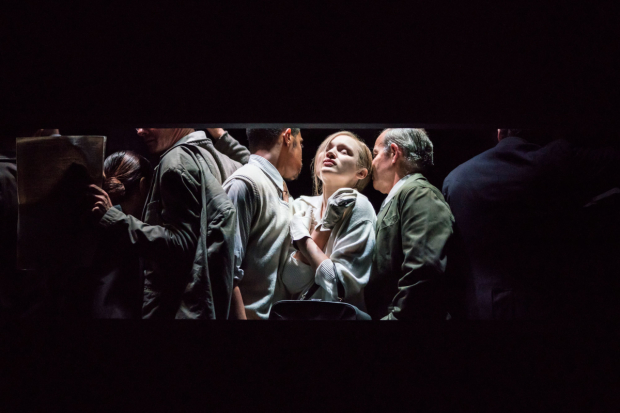Review: Machinal (Almeida Theatre)

© Johan Persson
Sophie Treadwell's radical drama about a woman trapped in the hostile environment of a patriarchal society is a dazzling piece of work. Literally so here, since lighting designer Jack Knowles snaps each short scene shut with two parallel lines of fierce, white light.
This highlights the agony of the woman's life, told in nine episodes. We meet our heroine first as Miss A in a typing pool, railing against the oppressive nature of her daily journey to work; by the close she is Helen Jones, convicted of murdering her husband, going to the electric chair still fighting against being forced to submit, still longing for a freedom that she cannot even describe. "God what a thing it is to be a woman!" she cries. "What you got to submit to! – to hell – and nobody says anything."
Machinal, written in 1928, has lost none of its cold fury, its expressionistic power to depict a woman trapped by a society that expects her to marry and conform. It is astonishingly modern; the scene in a speakeasy where Helen takes a lover is framed by a man persuading a reluctant woman to have an abortion, and a gay man seducing a young student. (It's odd to envisage Clark Gable in the midst of all this in the original production.)
Director Natalie Abrahami has chosen to emphasise this timelessness by deliberately blurring the time-frame. The office workers use old-fashioned typewriters, but by the close Helen's daughter is playing with an iPad. This frees the play from its period but renders some of its assumptions peculiar. Helen's sense of being imprisoned by the need to marry seems particularly tethered to a specific time and place.

© Johan Persson
But Miriam Buether's magnificent design helps to make sense of things – a mirrored ceiling reflecting back the action of each scene, whether it is a hotel room with a ghastly pink coverlet on the bed when Helen flinches from the attentions of Mr Jones (Jonathan Livingstone), the boss she marries for financial security, the rumpled sheets of her lover's bed, or the cold bleakness of the courtroom in which she is tried in "the trial of the century."
Abrahami never lets up the propulsive pace, the sense of rushing destiny, and is much assisted by a clever soundscape by Ben and Max Ringham which fills every scene with a clatter of noise, and under-stated choreography by Arthur Pita which finds naturalism and stylisation in a single gesture. In this carefully-crafted, deeply-felt setting, the woman's plight becomes less an expression of individual striving and more an existential scream of despair.
The problem, and it has been the problem in many productions of Machinal, is that Helen's combination of passivity and extraordinary sensitivity make her more a symbol than a figure to elicit sympathy. Emily Berrington plays her from the opening moment like a creature who is missing several layers of skin, maddened by modern life and its expectations. But she doesn't find a way to let us into her emotions; she remains essentially one-note and elusive.
This means that for all its shuddering intensity, Machinal remains here more a play to admire and wonder at than a revelatory insight into a woman's desperate soul. It is chilly as well as dazzling.















